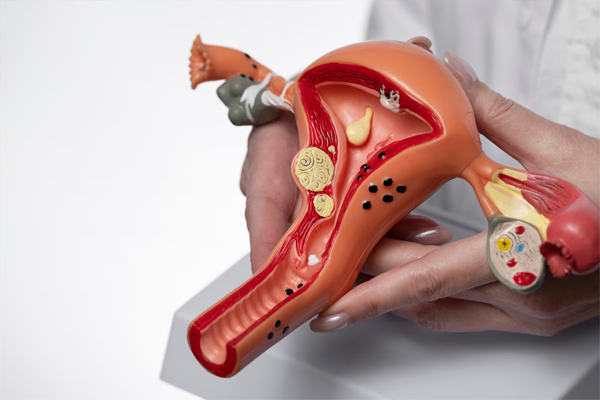
Everything You Need to Know About Trichomonas Vaginitis
Vaginitis (vaginal infection) is one of the most common reasons people visit gynecologists. It occurs due to inflammation of the vaginal mucosa (discharge).
Vaginal discharge is typically clear and resembles egg whites. Its purpose is to keep the vaginal environment moist. The discharge may increase during natural conditions such as ovulation, pregnancy, or sexual arousal. However, this is normal and is not always considered a sign of illness, nor does it cause any complaints.
When the amount of vaginal discharge increases along with certain characteristics, it can indicate a problem. These signs include changes in the color and consistency of the discharge lasting more than 2-3 days, as well as itching, burning, and unpleasant odor in the vaginal area.
Around 90% of adolescent women are affected by vaginal infections. In about 30% of cases, two or more types of infections are observed together.
Vaginitis is generally not life-threatening, but if not treated correctly and promptly, it can lead to more serious health issues.
How Does Vaginitis Occur?
When studying the formation of vaginitis in individuals, three main causes have been identified. These include fungi (Candida albicans), bacteria (Gardnerella vaginalis), and parasites (Trichomonas vaginalis).
External factors, such as pH changes and disruption of the normal vaginal flora, play a major role in the development of vaginitis.
When two or more of these factors are present together, it is called mixed vaginal infection.
What is Trichomonas Vaginitis?
Trichomonas vaginalis is a microscopic parasite that is transmitted sexually (STD). The disease caused by this parasite is known as trichomonas vaginitis, also referred to as trichomonas infection or trichomoniasis in the medical world.
Around 180 million people worldwide are affected by trichomonas vaginitis annually. While the infection is more common in women, trichomonas vaginitis can also be transmitted to men through sexual contact. In women, it causes vaginal infections, while in some men, it can lead to urethral infection and prostatitis. These infections are treatable and do not cause lasting damage to the vagina or penis.
What are the Symptoms of Trichomonas Vaginitis?
The symptoms of trichomonas vaginitis tend to worsen during the menstrual period and pregnancy in women. The most common symptoms in women include:
Foul-smelling, excessive vaginal discharge
Yellow-green, foamy vaginal discharge
Blood in the vaginal discharge
Itching and irritation in and around the vagina (vulva)
Pain during sexual intercourse
Burning in the lower abdomen
Burning during urination
Although less common in men, symptoms of trichomonas vaginitis may include:
Discharge from the urethra
Burning during urination or after ejaculation
Frequent urge to urinate
Irritation at the tip of the penis
How is Trichomonas Vaginitis Transmitted?
The Trichomonas vaginalis parasite is transmitted during sexual intercourse when a healthy individual has genital contact with an infected person. Even individuals who are infected but do not show symptoms can transmit trichomonas vaginitis to their partners.
Trichomonas infection spreads during sexual intercourse from penis to vagina, vagina to penis, or between two vaginas. The parasite is not commonly transmitted to other parts of the body such as the hands, mouth, or anus.
In women, the lower genital system (vulva, vagina, cervix, or urethra) is the most frequently infected area, while in men, the urethra (inside the penis) is the most commonly affected.
Although there is not enough scientific evidence, it is thought that trichomonas vaginitis can also be spread through swimming pools, shared toilets, towels, and underwear.
How is Trichomonas Vaginitis Treated?
If you suspect you have trichomonas vaginitis, you should consult your doctor for treatment. A gynecologist (or urologist for men) will examine you to diagnose the problem and determine the appropriate treatment method.
A sample of the vaginal discharge is sent to the laboratory for microscopic examination. Additional tests for other sexually transmitted diseases may also be requested from you or your partner. The diagnosis of trichomonas vaginitis can be made using the Vaginal Culture Test performed at Viromed Laboratories.
If the organism is found in the discharge, treatment will begin for both you and your sexual partner. Ensuring your partner is also treated improves the success of treatment and reduces the chance of reinfection. It is important to avoid sexual intercourse for one week during the treatment period and after treatment.
The treatment typically involves oral medications in the form of pills or suppositories. The most commonly recommended antibiotics are metronidazole or tinidazole. You should not consume alcohol during the first 24 hours after taking metronidazole and avoid using this medication during the first three months of pregnancy. After taking tinidazole, avoid alcohol for the first 72 hours. These medications can cause severe nausea and vomiting when combined with alcohol.
How Can You Prevent Trichomonas Vaginitis?
Since trichomonas vaginitis is sexually transmitted, the only effective preventive measure is to use a condom during sexual intercourse. As with other sexually transmitted diseases, being in a monogamous relationship or having sex with a small number of partners reduces the risk of transmission.
In addition to these precautions, you can also pay attention to other factors that can facilitate the development of vaginitis.
These factors and how to prevent them are listed below:
Incorrect clothing choice: Avoid wearing tight, narrow, and synthetic fiber underwear and pants. These clothes limit air circulation and increase heat and moisture around the vagina, which can foster fungal infections.
Personal hygiene: Cleanliness is essential in protecting against potential diseases, especially in the vaginal area. Changing underwear daily, not using tampons or pads for extended periods, and washing and drying from front to back are crucial.
Chemical exposure: Avoid external chemicals that can disrupt the vaginal flora or protective layer. Overwashing the vagina with soap or intimate cleansers, exposure to chlorine-rich pools, or using scented toilet paper can lead to allergic reactions and promote inflammatory diseases.
Medication use: The use of birth control pills or prolonged and uncontrolled antibiotic use can contribute to vaginal infections.